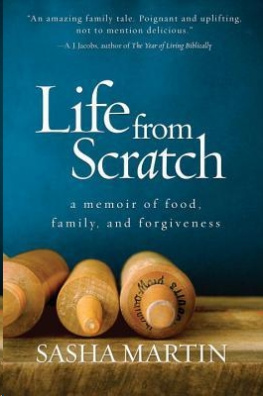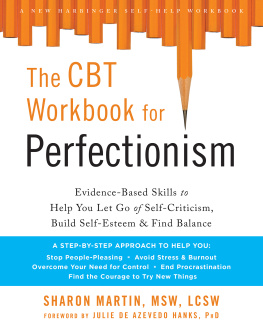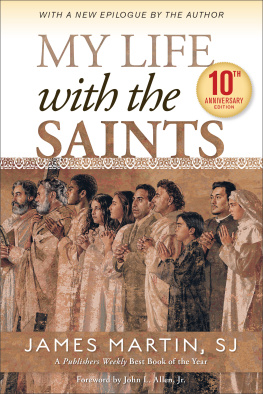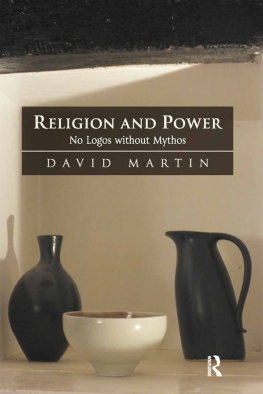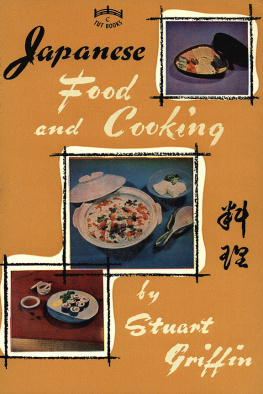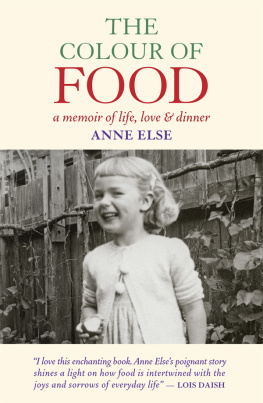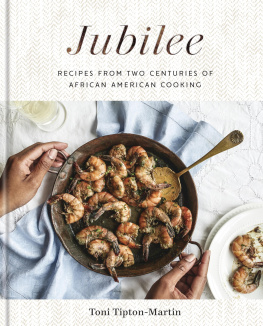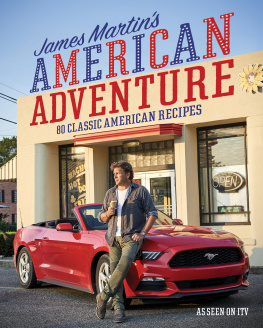Published by the National Geographic Society
1145 17th Street N.W., Washington, D.C. 20036
Copyright 2015 Sasha Martin. All rights reserved. Reproduction of the whole or any part of the contents without written permission from the publisher is prohibited.
Library of Congress Cataloging-in-Publication Data
Martin, Sasha.
Life from scratch : a memoir of food, family, and forgiveness / Sasha Martin.
pages cm
Includes index.
ISBN 978-1-4262-1374-8 (hardback)
eBook ISBN: 978-1-4262-1375-5
1. Martin, Sasha. 2. CooksUnited StatesBiography. 3. CooksUnited StatesFamily relationships. I. Title.
TX140.M37A3 2015
641.5092dc23
[B]
2014033548
The National Geographic Society is one of the worlds largest nonprofit scientific and educational organizations. Its mission is to inspire people to care about the planet. Founded in 1888, the Society is member supported and offers a community for members to get closer to explorers, connect with other members, and help make a difference. The Society reaches more than 450 million people worldwide each month through National Geographic and other magazines; National Geographic Channel; television documentaries; music; radio; films; books; DVDs; maps; exhibitions; live events; school publishing programs; interactive media; and merchandise. National Geographic has funded more than 10,000 scientific research, conservation, and exploration projects and supports an education program promoting geographic literacy. For more information, visit www.nationalgeographic.com .
National Geographic Society
1145 17th Street N.W.
Washington, D.C. 20036-4688 U.S.A.
For rights or permissions inquiries, please contact National Geographic Books Subsidiary Rights:
Interior design: Melissa Farris
15/QGF-CML/1
v3.1
For my brother, that shooting star, still blazing in my heart . We shall not cease from exploration,
and the end of all our exploring
will be to arrive where we started
and know the place for the first time .T. S. Eliot
CONTENTS


Authors N o te
M EMORY IS AN IMPERFECT COMPANION AT BEST , and so these pages portray the events of my life only as I remember them. Still, Ive done my best to be objective. Ive made sacrifices for narrative flow: Certain minor characters are composites, and the occasional scene has been reordered or collapsed. Names and certain identifying attributes of characters have been changed; the notable exceptions are my husband and daughter.

Prol o gue
T HIS IS NOT THE BOOK I MEANT TO WRITE .
This was supposed to be a spirited book about the four years I spent cooking my way around the world from my tiny kitchen in Tulsa, Oklahoma. The pages were going to be filled with sweet stories about overcoming pickiness and teaching my husband and daughter to love the world cuisine I featured on my blog, Global Table Adventure. It was going to be an easy book to writeone that wouldnt make me cry, or make my relatives so nervous that Id be obliged to employ pseudonyms.
But try as I might, I couldnt stay within the parameters of such a narrative; the easy truth is as much a lie as any. What drove me to obsessively cook a meal from each of the worlds 195 countries cannot be explained by a simple passion for cooking alone.
Most people who have had a rough background will admit theres something unsettling about finding happiness after difficultythat even after we unwrap this gift, we dont know how to stop searching, rummaging, pilfering for something else. We walk haltingly through life, ready for the other shoe to drop. The question is not if, but when.
There is a hunger for peace so deeply rooted in me that I cannot trace the origins to any one moment in my life. So I had to start at the beginning, from the foods of my wayward childhood, to those that shored up my teenage years overseas, to those I discovered in my blog. Together, they helped me learn to love my world as I cooked my way around it.
Everything depends on the moment the spice hits a hot pan: whether it sizzles with a mouthwatering fragrance or turns to ash. Once, I thought happiness was the sizzle in the pan. But its not. Happiness is the spicethat fragile speck, beholden to the heat, always and forever tempered by our environment.
This is the story I share with you.
PART ONE
Conflict of Herit a ge

Good kitchens are not about size.
Nigel Slater
CHAPTER 1

Living Room Kit c hen
I AM MISSING TWO FINGERPRINTS on my right hand. The neat spiral of lines on my ring and middle fingers suddenly flatten out, melted into circles that fan outward like the tail of a peacock. I first noticed the marks in fourth grade, when my school started filing fingerprints for the police. I wondered why mine looked so different from those of my classmates.
After school, I asked Mom about it. But she was driving. She couldnt inspect my fingers. Decades later I found out the truth: At age one Id toddled over to an open broiler while Mom was making hamburgers. Her back was turned for a second to grab a pot holder. When she came back from the hospital, where they treated my third-degree burns and blasted her for child abuse, she found the shrunken pucks of meat on the still open grate. Cold. Congealed.
She never made hamburgers again.

My older brother Michael and I spent much of our early childhood under the kitchen table, dancing wooden animals across the linoleum. We pretended the old trestle was a cave while Mom stitched odd jobs above us to make ends meet. Our father had vanished long ago: Mom was the only parent we knew. Sometimes Michael would inspect my scarred fingertips. Maybe youre an alien! hed exclaim over the hum of Moms ancient Singer. I can still see those laughing blue eyes; even in the shadows they sparkled.
I loved to watch Michael laugh. His wiry body wound up from the effort, tears filled his eyes, and his dimpled cheeks puffed out like sails. When he teased me, Id sulk, lowering my face until my straight-browed, four-story forehead was all anyone could see, my tiny chin and owl eyes buried in my chest. But with the wisdom that came from being 21 months my senior, Michael knew just where to poke my sides until a giggle escaped.
Decades later, whenever I sat alone looking at my marred fingerprints, regret would overwhelm me, as though the rough and tumble course of our childhood had been set in motion by my careless curiosity as an infant. My injury instigated our initial visit from the Department of Social Services; though the judge dismissed the case, there was no wiping the slate clean once our names were in the system. Over the years, the kitchens I grew up in and around continued to draw me in, like a moth to a flame, as though I might recapture whatever innocence Id lost in that warm, fragrant space.

There are mysteries buried in the recesses of every kitchenevery crumb kicked under the floorboard is a hidden memory. But some kitchens are made of more. Some kitchens are everything .
A few years after I burned myself, when I was four and Michael was six, Mom moved us to a streetcar suburb of Boston called Jamaica Plain (though whatever plains had been in those parts had long since been covered by concrete). Our one-bedroom apartment was on the first floor of a skinny triple-decker house with cream siding and evergreen trim. In those days, gangs roamed the parks, and shifty figures lurked by the towering railway known as the Elevator Train at the end of our street. But the meager rent was all Mom could afford.
Next page
